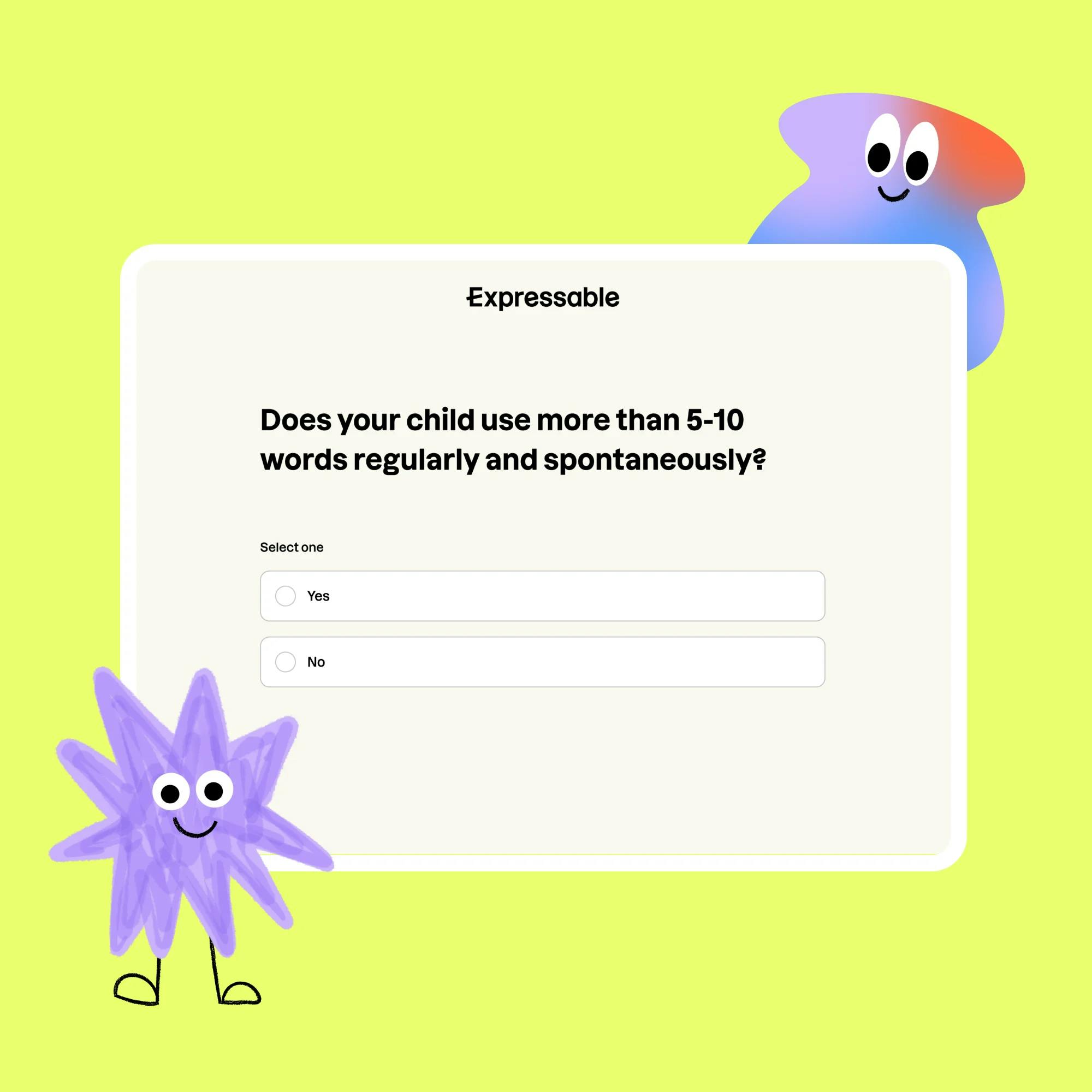Many parents and caregivers become alarmed when they hear their young child stutter. It can be frustrating and upsetting to watch your child struggle to communicate. You may be asking yourself, “Will my child outgrow their stutter?” or “Should I be concerned enough to get professional help?”
In some cases, stuttering is considered developmental, and it will go away on its own. Read on to learn when a stutter is considered “typical” in children, as well as when to seek help from a speech-language pathologist.


What is a stutter?
Stuttering, sometimes called stammering or disfluency, is a communication disorder that disrupts the natural flow of speech. Stuttering can begin gradually and develop over time, or it can appear suddenly.
For many children, stuttering is simply a natural part of learning language and putting sentences together. These children will likely grow out of stuttering. For others, however, the stutter may get worse as they get older, or persist throughout their life.


Is my child’s stutter normal?
Stuttering comes in many forms. Let’s take a look at what is considered to be “more typical” versus “less typical” when it comes to stuttering.
More typical = What most people experience some of the time
Repeating phrases and whole words (“But-but-but I want one!”)
Use of filler words (“um” and “uh”)
The child has no negative reaction or frustration with their disfluencies
No signs of physical tension in their mouth or other body parts
Disfluent periods (periods of stuttering) last less than 6 months
No other speech or language difficulties
Joseph's story
Discover how Joseph, a preteen who stutters, transformed his speech, confidence, and sense of control.
 Read Joseph's story
Read Joseph's storyLess typical = More commonly observed in a person with a fluency disorder
Blocked sounds (your child tries to say a sound, but nothing comes out)
Prolongations (“I fffffffffeel angry.”)
Repeating sounds or syllables (“I see a b-b-b-baby,” “I want an ap-ap-ap-apple, please.”)
Secondary behaviors (movements such as hand flapping, tapping, blinking, or throat clearing) that occur along with the stuttering
Frustration or negative reaction to stuttering
Disfluent periods last more than 6 months
Risk factors for persistent stuttering
There are a variety of factors that contribute to your child’s risk for stuttering. These include the following:
A family history of stuttering
Being male (there is a higher incidence of stuttering in males)
Consistent periods of stuttering lasting longer than 6 months
Negative reactions and/or frustration associated with stuttering
Physical tension and/or secondary behaviors
Stuttering begins after the child turns 4
Delayed/disordered language skills
Other speech sound errors, or speech that’s hard to understand
When should you contact a speech therapist for your child’s stutter?
The more of these factors that are present, the higher the risk for persistent stuttering. If your child is showing signs that their stuttering is worsening over time, their speech is especially strained, or they begin to make body or facial movements while speaking, it’s best to have an evaluation from a licensed speech therapist.
Speech therapists are the most qualified professionals to evaluate and determine whether your child is at risk for long-term problems. You can contact a speech therapist directly, or talk with your child’s pediatrician. They can give you a referral to a speech therapist.
Will your child outgrow their stutter? If your child does not display any characteristics of “less typical” stuttering, and they don’t have many of the risk factors noted above, their stutter may go away over time. However, it’s highly recommended that you keep an eye on your child’s speech. If you notice any changes, talk with their doctor or contact a speech therapist.


How can you help your child with their stutter at home?
There are many strategies speech therapists use when it comes to helping kids manage a stutter. However, you can also support your child’s ability to speak more smoothly while also maintaining positivity and building their confidence. Try modeling “easy speech,” making sure there are chances for turn-taking during a conversation, and removing any conversational and time pressures.
Looking for more tips? Check out this article to learn about things to avoid when talking with a child who stutters, even if that stutter might be temporary.
It’s normal to be concerned if you hear your child begin to stutter. While many children outgrow a stutter, sometimes a stutter persists. This can have a large impact on a child’s communication success and self-esteem. As with most developmental issues, the best prevention is often early intervention. So if you have concerns, trust your gut. Reach out to a speech therapist for support.
How Expressable Can Help
Concerned your child isn't reaching age-expected milestones? Looking for communication support from a professional? Expressable is a national online speech therapy practice serving children and adults. We treat all major areas of communication and feeding, offer flexible hours including evenings and weekends, and accept most major health insurance plans. We’re proud to have earned more than 3,000 5-star reviews from our clients (4.9/5 average).
Our therapy model is centered on parent and caregiver involvement. Research proves that empowering caregivers to participate in their loved one’s therapy leads to better outcomes. That’s why we combine live, 1-on-1 speech therapy with personalized education and home practice activities for faster progress.
Communication is more than words. It’s how we share how we feel and show who we are. We’re here to help you or your child do just that.

 Alexis Irazoque, M.S., CCC-SLP
Alexis Irazoque, M.S., CCC-SLP









